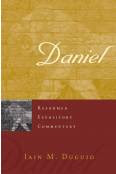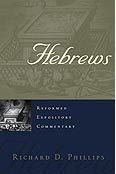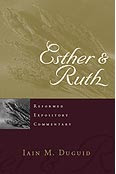Of The Making of Many Books There is No End Recommendation #15: An Excellent Commentary Series – The Reformed Expository Commentary
 Biblical commentaries seem to run off the printing press without end. Some are good, some are bad. Some are technical, some are popular. Some are worth having, many are not. Why bother studying a commentary? Would it not be better to just stick with the text of Scripture? I “bother” with commentaries because I do not assume that I know or can come to know the meaning of a given verse or passage on my own cogitating off in a corner. I would rather read with the church. That means reading Scripture with the assistance of commentaries.
Biblical commentaries seem to run off the printing press without end. Some are good, some are bad. Some are technical, some are popular. Some are worth having, many are not. Why bother studying a commentary? Would it not be better to just stick with the text of Scripture? I “bother” with commentaries because I do not assume that I know or can come to know the meaning of a given verse or passage on my own cogitating off in a corner. I would rather read with the church. That means reading Scripture with the assistance of commentaries.
In many ways my rationale for reading biblical commentaries is similar to, if not identical with, my reason for being confessional and holding conversation with my tradition. Yes, it is possible for my commentary, and the confession I embrace, and the tradition in which I stand, to be wrong. If they are, they can be corrected. But if I am left to myself it is much harder to correct my errors. If I am in a continual dialog with commentaries and my confession and my tradition I am more likely to get my interpretation of Scripture right.
Commentaries are a means to a better understanding of God’s Word. The standard advice I frequently gave to students a t the seminary bookstore where I used to work was that students should stay away from buying sets. All sets have their weak link and some sets seem to be made up principally of weak links. There were and are exceptions to this rule. But the general rule is still true. Build a commentary library by researching what others think the best commentaries on any given book of the Bible are and evaluate them for yourself.
t the seminary bookstore where I used to work was that students should stay away from buying sets. All sets have their weak link and some sets seem to be made up principally of weak links. There were and are exceptions to this rule. But the general rule is still true. Build a commentary library by researching what others think the best commentaries on any given book of the Bible are and evaluate them for yourself.
I am pleased to note an exception to the “don’t-buy-commentary-sets” rule. The Reformed Expository Commentary series is an excellent, intermediate-yet lay-accessible commentary series. I have not only used various volumes in the series for my sermon preparation, but I use them in my personal worship time as well. I would describe these as meat and potato commentaries. That is, these volumes, individually and as a developing set, are rock solid. The best wa y to describe them is that they are, as the editors themselves aver, redemptive-historical, doctrinal, and applicatory. If I may put it another way, these commentaries have all the strength of a James Boice expository commentary, with a biblical theological flavor. This should not be surprising given the fact that the series editors are Rick Phillips and Phil Ryken, former colleagues of Dr. Boice at Tenth Presbyterian Church in center city Philadelphia and graduates of Westminster Theological Seminary. The series is published by Presbyterian & Reformed Publishing and will be useful to scholar, pastor, seminary student, and layperson. Tolle lege, tolle lege! Take up and read!
y to describe them is that they are, as the editors themselves aver, redemptive-historical, doctrinal, and applicatory. If I may put it another way, these commentaries have all the strength of a James Boice expository commentary, with a biblical theological flavor. This should not be surprising given the fact that the series editors are Rick Phillips and Phil Ryken, former colleagues of Dr. Boice at Tenth Presbyterian Church in center city Philadelphia and graduates of Westminster Theological Seminary. The series is published by Presbyterian & Reformed Publishing and will be useful to scholar, pastor, seminary student, and layperson. Tolle lege, tolle lege! Take up and read!


